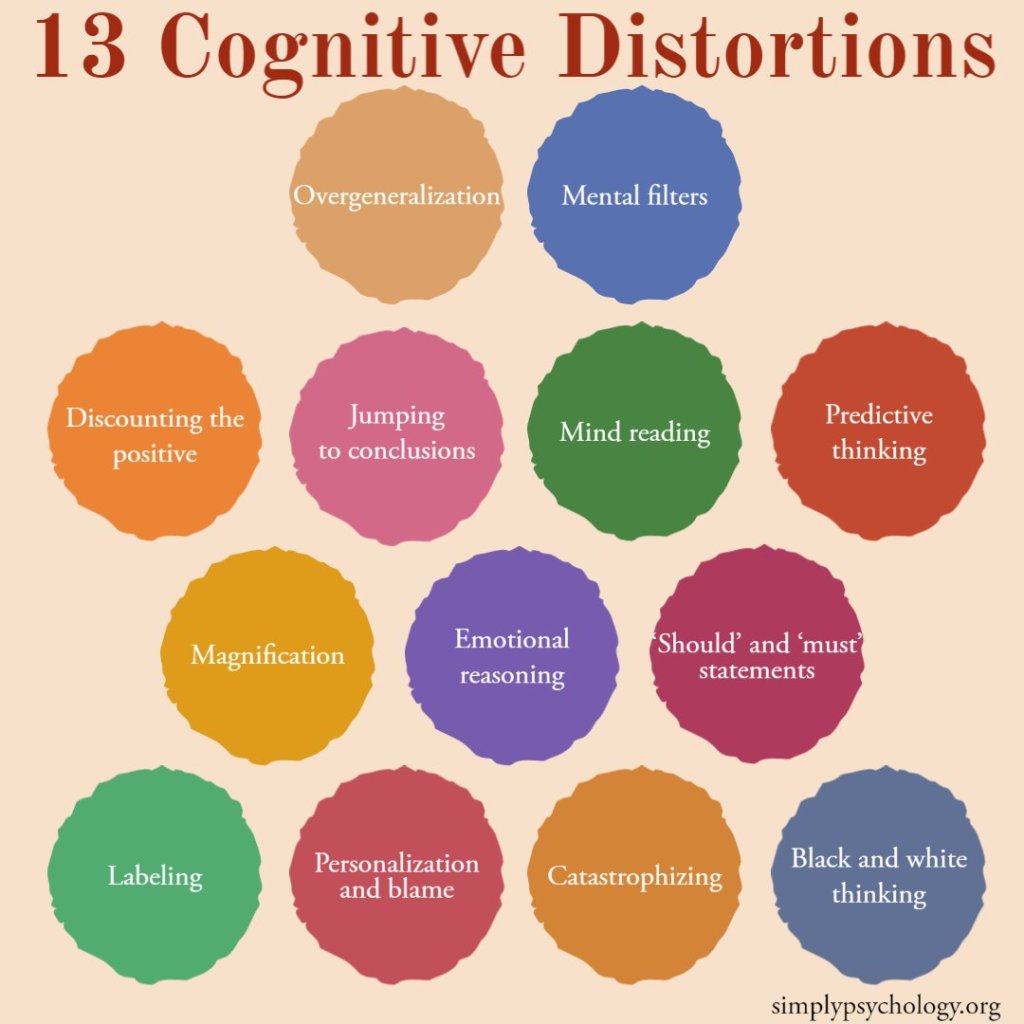In Cogntive Behaviour Therapy (CBT), the focus is on your thoughts and how this impacts behaviour. Our brains job is to process information, and in modern society, we are constantly processing information from the environment, especially due to our increased connectivity. Problems can arise when thoughts become overwhelming, and in CBT, these are categorised into 13 cognitive distortions.

Overgeneralisation
This is when you may over generalise experiences from the past or present. This means you’ll worry that things will be repeated because it’s happened before. In relationships, you may become insecure because you think you will be abandoned or cheated on because you experienced this before. This can be damaging to present or future relationships. This might also relate to not being chosen for a role after an interview and thinking you’d never succeed in an interview, or not passing a test and thinking you’ll fail every test in the future. This thought will be very limiting.
Mental Filters
Trigger warning in this paragraph. Reference to suicidal thoughts. Please see charities at the bottom of this post if you need support with this topic.
This is similar to tunnel vision, in which the thoughts get over focused on one negative aspect. This might mean that because one thing goes wrong in your day, you decide the whole day is shit and you then feel miserable, like getting caught in bad traffic ruins the day completely. This could be problematic if you are dating, and you fixate on one difference or disagreement that occurs, for instance, their interests. Imagine they like a music genre you hate, but everything else was perfect, and you got on well. Unfortunately, because of this you decide not to have another date. This could also relate to how you view your life. When I had a low point recently, I had thoughts that life wasn’t worth living because only bad things keep happening. I’m glad I was able to refocus in more positives and get through that dark phase.
Discounting the positives
This is similar to mental filters. However, when positives happen, you find excuses or reasons to discredit it. This may be recognition praise, acknowledgement, or an achievement, and you think you’re undeserving, it was a coincidence, or you were just lucky. When this happened to me in the past, I got recognition for clients doing well when I had worked with them, but I would dismiss and say the team and the client did the work. I simply made the plan for them to follow. Also, if my boss ever gave me praise, I thought, “She’s only saying that because she knows you have depression and she’s trying to make you feel better.”
Jumping to conclusions
This can overlap with other distortions. Assuming something will happen in the future, someone is thinking something, or that they will act in a certain way. This can be problematic because you may be making yourself anxious about something that may or may not happen. This might impact your ability to cope with daily life, or your relationships.
Mind reading
This involves making assumptions about what someone else is thinking. This may be part of your gut instincts, but also, the mind may be biased towards protecting you from negative interactions. I am often surprised when I actually find out my mind reading was incorrect. Communicate in a healthy way if you need reassurance, and try to be present and not get intangled in negative, unhelpful thoughts. This can be damaging for relationships, as you might pull away and isolate yourself, or the person becomes annoyed with your constant assumptions or overreactions.
Predictive thinking
This is when you predict the future. I have in the past practised scripts with people so I could prepare what I would say. But you can not predict what someone will say. It actually made communicating less effective for me and made me increasingly more anxious, ruining the days or hours leading up to seeing the person. I work on staying present before and during the activity or conversation, and actively listen when I’m with people instead.
Magnification
This is similar to mental filters and discounting the positives, but you minimise positives in yourself whilst exaggerating these qualities in others. In reverse, negatives are emphasised when comparing yourself to others. This might happen with social media, where you see the best parts of someone’s life. You think they have everything, and you are a failure (related blog post). This can negatively impact your self-esteem.

Emotional reasoning
This means opinions or thoughts about situations, people, or self are based on feelings about it. When you have a bad feeling about something and you let this overule how you feel about it. You should recognise emotions and accept them, but try not to let them drive your behaviours. Lashing out when you are angry or shutting down when upset, for example, without considering all the facts of a situation can be damaging to relationships.
‘Should’ and ‘must’ statements
This relates to expectations that are imposed on ourselves or others. This can be problematic in relationships if you think someone should or must act in a certain way and you have unreasonable expectations. This can also happen for yourself, and I think this is a problem for many of us. Feeling like you have to do it all and have it all can make you feel unhappy. These may stem from gender expectations or stereotypes, cultural or family expectations. Social media can falsely reinforce these unhelpful ideas and thoughts. It is better to focus on your values and live in line with these.
Labelling
These involve labelling yourself, others, or situations with negative thoughts or ideas. This might be “I’m stupid,” “I’m ugly,” or “I’ll always be unlucky.” This might happen with friends if they do one thing that upsets you and you decide that they are “always a bitch” and you discredit everything positive from your friendship. These unhelpful stories and thoughts are damaging to your outlook, your self-esteem, and can impact relationships.
Personalisation and Blame
This involves taking the blame or responsibility for things that go wrong in their own lives or people around them. Taking ownership of things that are not your fault will make you feel extremely unhappy and worthless. You may also feel like you’re being excluded or targeted incorrectly. If you try to take responsibility for everyone around you, this may lead to, or be part of, people pleasing (related blog post). This leads to low self-esteem and makes you vulnerable to being a scapegoat or a victim of gaslighting.
Catastropising
This means you make things worse than they are. It’s the worst thing that could have ever happened to anyone ever. You consider the worst possible outcome, and then you begin to believe it to be true. For instance, if you had small health concerns and then you worry it could be terminal cancer before speaking to the doctor or having severe enough symptoms.
Black and white thinking
This distortion means you only see things in extremes. This is also called ‘all or nothing thinking’. Things are either good or bad, a failure or a success. This can mean opportunities for learning are dismissed, or you might be hard on yourself if you don’t completely succeed at something.
You can manage your unhelpful, negative, and/or intrusive thoughts using defusion and mindfulness. To learn more about defusion, check out my previous blog on defusion. See the video below for some more information about mindfulness, or check out not one, not two, but three posts on mindfulness I’ve already shared!
Charities
If you’re concerned about your own or someone else’s well-being, or you found topics in this blog upsetting, reach out to any one of the following charities.
That’s me. I still do most of those things.
LikeLike
It’s great you are able to recognise this. Remember, thoughts are not facts. 🫶🫶
LikeLiked by 1 person